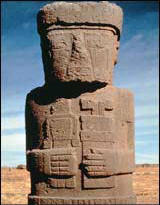|
||||||
|
History
According to carbon-dated research, the first civilizations of the Bolivian Altiplano developed around the year 2000 BC. Among the most important were the Wankarani, the Chiria and the Tiwanaku, the latter being one of the principal cultures among the great Pre-Colombian civilisations. Later came the Aymaras and the Collas, who were dominated by the powerful Inca civilisation until the arrival of the Spaniards.
In 1535, the Spanish 'conquistadores' Pizarro and Almagro initiated the conquest of the Collao, and ten years later the silver deposits of Potosi were discovered. Spanish domination lasted for three centuries in Upper Peru (presently Bolivia). In 1809, rebellions were initiated that were to last for fifteen years before Bolivian independence was finally achieved. |
|
|
The Bolivian state was officially declared indepedent on August 6 1825 in the city of La Plata, presently Sucre, and was named in honour of the liberator Simon Bolivar. The name Bolivar was later changed to Bolivia at the suggestion of the liberator Jose Antonio de Sucre, who divided the Republic into departments.
Between 1879 and 1884 the War of the Pacific between Bolivia and Chile took place, resulting in the disastrous loss to Bolivia of its maritime littoral, leaving the country landlocked. Later conflicts with neighbours included the Acre conflict with Brazil in 1900-3 and the Chaco War with Paraguay from 1932-5.
Several revolutions followed the Chaco War, culminating in the 1952 revolution that ensured Victor Paz Estenssoro his presidency. The mines were then nationalised, with big political and social changes including a major program of agrarian reform. |
|

